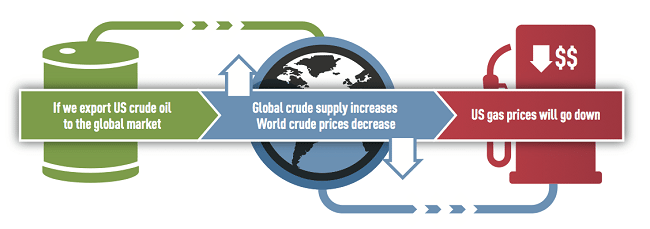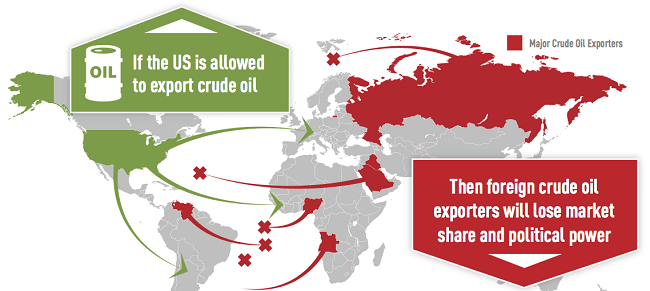Lifting the Crude Oil Export Ban
The Bipartisan Policy Center has prepared three issue briefs to promote a greater understanding of the issues surrounding the crude oil export ban. This series includes a topic overview, a review of potential domestic effects and an assessment of geopolitical implications.
In 1975, Congress passed the Energy Policy and Conservation Act, which paved the way toward banning the export of domestically produced crude oil and built upon existing domestic price controls, in response to the 1973 Arab oil embargo. At the time, such measures were seen as a means to secure U.S. “energy independence” and maintain low oil and gasoline prices in the United States. But global and domestic oil markets have both substantially changed since the 1970s. Domestic price controls for oil were lifted in 1981, and crude oil markets are now globally integrated, with prices set by global supply and demand.
As BPC President Jason Grumet outlined in testimony to the House Foreign Affairs Terrorism, Nonproliferation and Trade Subcommittee earlier this year, BPC supports lifting the crude oil export ban.
Explainer I: Crude Oil Export Ban Overview
America’s energy position is very different today than it was in 1970s. The advent of hydraulic fracturing and shale oil and gas development, particularly in the Bakken (North Dakota) and Eagle Ford (Texas), has significantly increased U.S. energy production volumes. Indeed, oil production has grown more in the United States over the past five years than anywhere else in the world. View the full brief
Explainer II: Domestic Impacts of Lifting the Export Ban
Global prices of crude oil are the single-most important determinant of U.S. gasoline prices. Allowing U.S. crude oil on the global market would increase supply, putting downward pressure on gasoline prices. View the full brief
Explainer III: Geopolitical Ramifications of Lifting the Crude Export Ban
Repealing the crude oil export ban could have a significant impact on geopolitics and national security. Lifting the ban would allow the United States to strengthen its position as a world leader in the energy market by increasing its ability to produce greater amounts of crude oil. View the full brief
Infographic: The Effects of Lifting the Crude Oil Export Ban

Research shows that lifting the export ban would actually reduce the price of gasoline in the United States. This is because gasoline prices are determined by the global market. Indeed, recent studies show that the price of gasoline in the U.S. is more reliant on the global benchmark of crude oil than the domestic price. View the full infographic
Infographic: The Geopolitics of Lifting the Crude Oil Export Ban
An increase of American crude oil in the global market place likely diminishes the influence of other exporting nations by weakening their market share. Assuming demand remains constant, greater volumes of crude oil from stable suppliers, such as the U.S., grants more power to importing countries over potentially manipulative suppliers by offering steady diversification options. View the full infographic
Share
Read Next
Downloads and Resources
Support Research Like This
With your support, BPC can continue to fund important research like this by combining the best ideas from both parties to promote health, security, and opportunity for all Americans.
Give NowRelated Articles
Join Our Mailing List
BPC drives principled and politically viable policy solutions through the power of rigorous analysis, painstaking negotiation, and aggressive advocacy.

